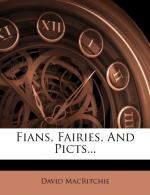One other statement, however, must be referred to. In another verse of Dorban’s poem, mentioned above, it is said that “the host of Meath” are buried “ar lar in Broga tuathaig.” This is rendered by Petrie, “in the middle of the lordly Brugh.” The translation is no doubt good; and it is open to any one to deduce therefrom that the chamber shown in the plan contained at one time the skeletons of the host of Meath. In that case, the “host” must have been very limited in number; and anyone who has crawled along the sixty-foot passage into the Brugh, and who adopts this view, must wonder a little as to how the corpses were conveyed along that passage, and as to the reasons which must have induced some people (prior to 1699, when the chamber was almost, if not altogether, void of such relics)[87] to drag all those bones out again, at much personal inconvenience. But “ar lar in Broga” may also mean “in the [burying-] ground of the Brugh”; and the descriptions quoted above from the Dinnsenchus show quite clearly that the ground in which “the host of Meath” were buried embraced a considerable tract of land, dotted over with mounds and monuments, differing only in degree from those of a modern cemetery.[88]
The twelfth-century commentator of Dorban’s poem states:
“The nobles of the Tuatha De Danann (with the exception of seven of them who were interred at Talten [which was the third ’Cemetery of the Idolaters’]) were buried at Brugh, i.e., Lugh, and Oe, son of Ollamh, and Ogma, and Carpre, son of Etan, and Etan (the poetess) herself, and the Dagda and his three sons (i.e., Aedh, and Oengus, and Cermait), and a great many others besides of the Tuatha De Dananns, and Firbolgs and others."[89]
But, afterwards, “the race of Heremon, i.e., the kings of Tara,” who used to bury at Cruachan (because that was the chief seat in their special principality of Connaught) came to bury at Brugh. “The first king of them that was interred at Brugh” was a certain Crimthann, surnamed Nianar, the son of Lughaidh Riabh-n-derg;[90] and the reason why Crimthann decided to abandon the burying-place of his forefathers was “because his wife Nar was of the Tuatha Dea, and it was she solicited him that he should adopt Brugh as a burial-place for himself and his descendants, and this was the cause that they did not bury at Cruachan."[91] It would appear that the ruling dynasty of the Tuatha Dea had ended in a female, both on account of Nar’s action in this matter, and because her husband became known by her name—as Nianar (Niadk-Nair) or “Nar’s Champion.”




